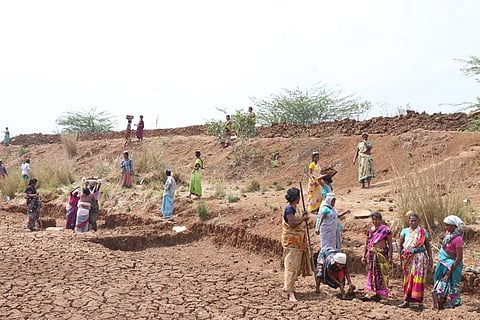

In Andhra's Kalavakonda village, the demand for works under the Mahatma Gandhi National Rural Employment Guarantee Act (NREGA) has declined due to wage issues over the last two years. Back in 2011, Kalavakonda village won a national award for the scheme's implementation. At the time, the villagers say over 400 people used to take part in the scheme, but these days it takes coaxing to even bring together 100 people from the village.
The villagers say interest in NREGA works has come down ever since the payment method for their wages got transferred from the postal service to Direct Benefit Transfer (DBT) through the banks and due to delay in payment of their wages. While some say the bank fails to share information on funds transfers, others say they are not seeing those wages at all.
“We get the money but the bank people don’t tell us that the money got credited, they don’t give us the money either. They are saying we will give and are asking us to bring every self-help worker to the bank, the payments are being denied to every member in the group if one member has a pending loan to the bank. They are just giving assurance that they will give us the money. When we used to collect wages from the post office, this problem was not there. But after DBT started we are facing this problem,” said Ratnam, a NREGA worker from the village.
NREGA was brought under the DBT from December 2016, where the wages of the workers are credited to bank accounts seeded to Aadhaar. Until then the workers would collect their wages from local post offices. Some of the workers, most of whom are marginal farmers, allege that the banks are taking away their NREGA wages to settle their existing crop loan repayments and Development of Women and Children in Rural Areas (DWCRA) loan repayments, but this is being done without their consent.
Representatives of Libtech India, a group of team of engineers, social workers and social scientists working with tribals in the two Telugu states say they found as many as 40 to 50 such cases in Kalavakonda village alone. "The workers here were not given an option to choose their payment agency, between a post office or a bank. Without consulting with the workers the government has decided to shift all NREGA accounts to banks, the government for some reason is adamant that they want all accounts to be with the banks. The reason being cited is that the banking services are more diverse but in reality, the wages are not given on time, nor are there enough banking correspondents or access banks in rural areas," said Chakradhar Buddha, program manager with Libtech India.
There are 447 job card holders at Kalavakonda located in the Chillakur mandal of the Nellore district, but Ratnam, an NREGA worker, said that these days not even 100 people show up for the NREGA work. Many of the workers have not received their wages since October 2018. “Even if we go to people's home and call them for the work, they refuse as they don't get the money on time and they migrate to some city or town to find work,” said Ratnam.
The workers prefer the postal service over the four banks located just over a kilometre from their village. “When wages used to come to post office we used to get the wages weekly, it was convenient. Now we don’t understand how much cash gets credited and which bank it's going to. This has been happening for over a year now. Nobody asked or told us about the shift of wages from post to the bank, no one had explained how the banking system works either. Earlier we used to get a pay slip and go to post office and get the money weekly once. The bank is a kilometre away. There are four banks and people have accounts in the four banks but not able to figure out which account the cash is getting credited to,” Ratnam added.
The delayed payments, loan repayments and refusal from the banks to release wages has led to more and more families from the village refusing to take up NREGA work. Despite the decreasing demand, the Kalavakonda village fares much better than other villages in the number of person-days employment provided in the mandal, according to government data on NREGA work.
Nellore district is one among the several districts in Andhra Pradesh declared as drought hit. The government had even increased the number of work days per person under NREGA from 100 to 150 taking the drought in these districts into consideration. But the average person's work days for Nellore stands at just 53.9 days. Of the 5,98,800 families enrolled with the scheme in the district, only 36,054 families have completed 100 days of work.
The government also has to pay Rs 1.5 crore to the NREGA workers at Chillakur mandal alone, and the pending wages of workers in the state stand at Rs 684 crores.
According to Chakradhar, the Kalavakonda village is a success story of NREGA implementation. He credits the field assistants in making a strong effort to mobilise people for the work. “Most of those who avail the work in the village are marginal farmers from tribal or Dalit communities. With the ongoing drought, it has become difficult for them to survive without daily wages. The interest in taking up NREGA work is on the decline as the villagers need to survive and can't rely on the payments. As the gas subsidy is also deposited to the bank, these people have no clue which payment is for what. The issue is that the NREGA payslips are not issued anymore. The payslip which used to come weekly had details on how much wages and how much work was done etc. Now with the slips not being issued, they don’t know how much money they are getting,” he added.